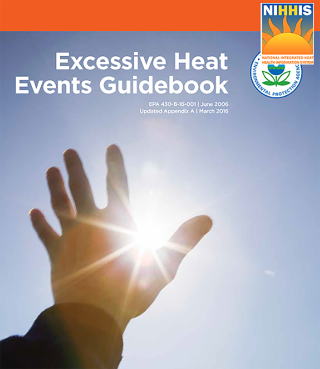Extreme Heat
Prepare for extreme heat
Individuals, communities, and businesses can plan for and reduce the effects of extreme heat. Keep yourself and your family cool when the thermometer tops out. Check weather alerts and warnings from the National Weather Service.
Homeowners
Check home cooling systems in spring
- Clean and trim around outdoor HVAC units so air can flow freely. Wash dust and dirt from cooling coils.
- Do annual, pre-season check-ups.
- Repair or replace your air conditioner.
- Check that ceiling or tabletop fans are in good working order.
- Clean fan blades so the motor can work efficiently and move air better.
- Use the EnergyStar cooling system checklist to maintain your cooling system.
Communities and facilities
Reduce Heat Islands
Urban and suburban areas can be "heat islands," a zone 2-10 degrees F warmer than the surrounding rural countryside. Heat islands use more energy to keep cool, which raises costs and reduces air quality. Communities can invest in long-term strategies such as:
- Promoting or installing cool or vegetated "green" roofs
- Planting more trees and vegetation
- Switching to cooler paving materials.
- Learn about Climate Change and Heat Islands.
Citizen Alerts
Cities are increasingly starting heat wave response programs that coordinate efforts among local agencies and alert residents. Some "best practices" include:
- Activate telephone heat hotlines.
- Alert neighborhood volunteers, family members, and friends.
- Provide public air-conditioned buildings and transportation to these facilities.
- Work with local "aging agencies" to educate at-risk individuals.
Building owners
Follow steps to save energy in summer:
- Measure the energy use of your building(s) and set an energy savings goal.
- Inspect cooling system equipment now and perform monthly maintenance.
- Turn back, or turn off cooling equipment when not needed.
- Get the occupants involved.
- Improve lighting systems.
- More ideas from EnergyStar.gov
What to do during extreme heat
- Check local air quality Hot weather can worsen ozone levels and other types of air quality.
- Call 911 in case of heat-related illness - heat stress, heat exhaustion or HEAT STROKE can result in death.
- If the power goes out, use generators only outdoors and away from doors, windows, and vents. Carbon monoxide is deadly, can build up quickly, and linger for hours. Learn how carbon monoxide impacts indoor air quality.
- Power outage tips from Ready.gov
- Stay out of direct sun and wear sunscreen of SPF 15 or higher. Be extra careful about sensitive individuals like children, the elderly, or the sick. Never ever leave anyone or an animal alone in a car, or a pool or other risky location, not even for "just a few minutes."
- Take sun safety action steps.
- Limit your outdoor activity to morning and evening. Spend time in cool places like a shopping mall, a library, or a theater.
- Make sure all animals have plenty of fresh water and are able to move out of direct sunlight.
- Reduce your home power use to help reduce brownouts or blackouts and smog/air pollution. Turn off nonessential lights, televisions, games, and computers, and unplug chargers.
Drive Smarter
- Find ways to help save fuel and reduce emissions if you're driving in hot weather.
- Roll the windows down at lower speeds; use the AC at highway speeds. Overcoming the air drag from open car windows at highways speed uses more fuel than the air conditioner.
- Drive with the windows open for a short time before using the AC, to let out the hot air before you run the AC.
- Park in the shade or use a sunshade or pop-up window screens.
- When you fill up your gas tank remember not to top it off. Topping off can spill gasoline which quickly evaporates. Gasoline vapors can harm your family's health and make ozone pollution and smog worse.
- Buy gas when it's cooler in the early morning or after sundown.

